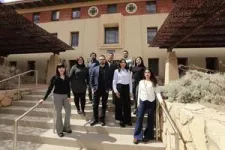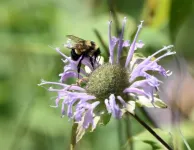(Press-News.org) CHAMPAIGN, Ill. — Public policies blocked many families of Mexican descent living in the U.S. from accessing vital services such as food and mental health care during the COVID-19 pandemic, even though these communities experienced some of the highest infection and mortality rates.
Thirty-eight perinatal women and mothers of young children were interviewed about the challenges they faced during the pandemic and proposed solutions to better meet the needs of their communities during future large-scale crises in a study led by University of Illinois Urbana-Champaign kinesiology and community health professor Sandraluz Lara-Cinisomo.
Co-authors of the study are molecular anthropologist Amy L. Non of the University of California-San Diego; Kimberly D-Anna-Hernandez, a professor of psychology at Marquette University; and U. of I. graduate student Mary Ellen Mendy and undergraduate students Jessica Avalos and Jacqueline Marquez.
The women in the study discussed the stressors they encountered during the pandemic, including their difficulties accessing mental health treatment, child care and food. Their suggestions and insights were used to identify actionable policies and programs that could help meet the needs of Latino communities during future emergencies.
The participants, who were interviewed between September 2021 and December 2022, were part of a longitudinal study that recruited them from a clinic in San Diego, one of the U.S. cities with large Latino populations of Mexican heritage.
The women were about 36 years old on average. Although about 81% of them were born in Mexico, many had resided in the U.S. for 17 years or more. About 31% reported having an annual household income of less than $21,000, while a similar percentage earned $40,000 or more, according to the study.
Lara-Cinisomo said participants faced complex stressors during the pandemic. Half of the women in the study said their families had challenges obtaining food due to loss of income and subsidies such as school lunches, as well as supply chain shortages and consumer stockpiling.
“While early in the pandemic various federal and state programs and policies were deployed to mitigate people’s risks for exposure and enhance families’ economic security, millions of tax-paying families of Mexican descent and other Latino backgrounds were excluded because of restrictions and exclusions set by those programs,” Lara-Cinisomo said.
The researchers found that more than twice as many Spanish speakers reported food-related issues compared with their English-speaking counterparts.
“Policymakers should consider how language barriers increase the risks of Spanish-speaking families losing out on benefits designed to meet their needs, such as CalFresh,” California’s iteration of the federal SNAP food assistance program for low-income people, Lara-Cinisomo said.
“Communicating food and health and safety information in linguistically appropriate media, such as texts, videos or commercials, is vital to ensure accessibility to people with differing literacy and technological skills and should be carefully considered by policymakers.”
Involving trusted sources in disseminating relevant and critical information was also recommended by the participants. For marginalized communities that have experienced historical discrimination and anti-immigrant propaganda, trust in these sources is vital, Lara-Cinisomo said.
“Research has shown that community engagement is critical in emergency preparedness and increases the likelihood of meeting the needs of marginalized communities,” Lara-Cinisomo said. Accordingly, she and her team recommended developing a contingency plan to train culturally and linguistically competent community health workers to cultivate networks of trusted community members to assist in crisis communication efforts.
Some women discussed feeling anxiety about the uncertainties associated with the pandemic, such as lockdowns and conflicting health information. These feelings were exacerbated by employment disruptions, pregnancy, and food access problems, and their concerns extended to family members residing in other households and those living in Mexico, participants told the researchers.
The majority of those interviewed advocated broadening access to food subsidy programs such as WIC and SNAP to offset income losses and food shortages during large-scale crises, along with providing public awareness campaigns about local food banks and assistance programs.
Even though California provides more services for undocumented immigrants — including paid family leave and one year of emergency coverage with mental health services under Medi-Cal, the state’s Medicaid plan, for pregnant women — caring for their mental health needs was a significant problem for many participants. Fifteen women reported needing mental health care, but twice as many of the English-speaking women mentioned these issues compared with their Spanish-speaking counterparts, the researchers found.
The researchers hypothesized that this difference may have been associated with cultural beliefs, with Spanish-speaking women feeling less comfortable disclosing mental health problems because of stigmatization compared with those who spoke English. Or, it may have been that those who spoke Spanish were more resilient or more concerned about immediate needs such as food assistance, the team said.
Participants recommended broadening access to mental health services for mothers and their families, promoting awareness with providers and patients, and disseminating mental health information and resources through videos and other media and via programs such as WIC.
Many of the women — largely those who spoke only Spanish — reported difficulties obtaining personal protective equipment and sanitization supplies because of shortages, consumer stockpiling, and price gouging, in keeping with other studies that showed low-income and marginalized communities were disproportionately affected.
Although the study sample was small, Lara-Cinisomo said it highlighted critical needs for responsive, culturally appropriate policies and programs to ensure the well-being of Mexican-descent perinatal women and mothers of young children during public health crises.
Lara-Cinisomo discussed the team’s findings and study participants’ recommendations during a virtual Briefing on Perinatal Health and Well-being on April 3 hosted by the journal Health Affairs, which published the study.
END
Perinatal women of Mexican descent propose solutions to pandemic-related stressors affecting Latinos
Women discuss the hardships faced obtaining food, medical information and mental health treatment
2024-04-04
ELSE PRESS RELEASES FROM THIS DATE:
Novel biological mechanism discovered that could lead to new treatments for neurological disorders, cancers
2024-04-04
The lab of Yongchao C. Ma, PhD, at Stanley Manne Children’s Research Institute at Ann & Robert H. Lurie Children’s Hospital of Chicago discovered a fundamental biological mechanism that could lead to new treatments for neurological diseases, such as spinal muscular atrophy (SMA) and autism, as well as different cancers. The study was published in the journal Human Molecular Genetics.
Dr. Ma’s team found that chemical modification of RNA (called RNA methylation) regulates mitochondrial ...
Stellar collisions produce strange, zombie-like survivors
2024-04-04
Despite their ancient ages, some stars orbiting the Milky Way’s central supermassive black hole appear deceptively youthful. But unlike humans, who might appear rejuvenated from a fresh round of collagen injections, these stars look young for a much darker reason.
They ate their neighbors.
This is just one of the more peculiar findings from new Northwestern University research. Using a new model, astrophysicists traced the violent journeys of 1,000 simulated stars orbiting our galaxy’s central supermassive black hole, Sagittarius A* (Sgr A*).
So densely packed with stars, the region commonly experiences brutal stellar collisions. ...
Rusty-patched bumblebee’s struggle for survival found in its genes
2024-04-04
A team of researchers has uncovered alarming trends in the first range-wide genetic study of an endangered bee species. The study, led by Colorado State University and published in the Journal of Insect Science, will inform conservation and recovery efforts for the rusty-patched bumblebee – a species that was once common in the United States but has declined from about 90% of its historic range.
The rusty-patched bumblebee was the first bee species to be federally listed as endangered in 2017 through the U.S. Endangered Species Act. Its numbers dropped rapidly starting in the late 1990s, likely due to a combination of pesticides, ...
Research collaboration aims to enhance cereal crop resilience to acidic soils and improve agriculture sustainability
2024-04-04
ST. LOUIS, MO., April 4, 2024 — Acidic soil caused by changing climate patterns threatens agriculture sustainability across the globe. But the problem goes far beyond rising temperatures. One major cause for concern is more acidic soil, a product of increasing rainfall. Acidic soils with low pH are widespread globally and common in tropical and sub-tropical regions, where food security is a serious challenge. Climate change has exacerbated the problem. Acidic soil can result in aluminum toxicity, putting further stress on global agriculture. A new collaborative research team from the US and Brazil received a $2 ...
Introducing New York Valves: The Structural Heart Summit
2024-04-04
NEW YORK – April 4, 2024 – The Cardiovascular Research Foundation® (CRF®) is excited to introduce New York Valves: The Structural Heart Summit, the expanded next iteration of our renowned annual Transcatheter Valve Therapy (TVT®) conference. Taking place June 5-7, 2024, at the Jacob K. Javits Convention Center, North in New York City, the new summit will be a world-class educational experience in the field of structural heart interventions.
“New York Valves 2024 signifies an important milestone for our organization,” said Juan F. Granada, MD, President and Chief Executive Officer of CRF® and New York ...
"Drop industrial agriculture": Major study reports that people and environment both benefit from diversified farming, while bottom lines also thrive
2024-04-04
Mixing livestock and crops, integrating flower strips and trees, water and soil conservation and much more: Massive new global study led by the University of Copenhagen and University of Hohenheim, has examined the effects of diversified agriculture. The conclusion is abundantly clear – positive effects increase with every measure, while negative effects are hard to find.
Laura Vang Rasmussen of the University of Copenhagen can finally wipe the sweat from her brow. For the last four years, she has served as the link between 58 researchers on five continents and as lead author of a major agricultural study which gathered ...
Portable swept-source Raman spectrometer for chemical and biomedical applications
2024-04-04
In 1928, Indian physicist Sir C. V. Raman and his colleague K. S. Krishnan discovered that when light interacts with matter, parts of the scattered light undergo changes in energy due to interaction with molecular vibrations, resulting in what is known as Raman scattering. The discovery laid the foundation for Raman spectroscopy, a technique that takes advantage of these energy changes to create a unique fingerprint of the molecular structure of the material.
Currently, dispersive Raman spectroscopy ...
An hereditary liver disease cured with the help of gene scissors
2024-04-04
Argininosuccinate lyase deficiency (ASLD), also known as argininosuccinic aciduria, is a disease that has been enriched in the Finnish genetic heritage. In this severe metabolic disease, the body does not process proteins normally, instead resulting in a very dangerous accumulation of argininosuccinic acid and ammonia. Excess ammonia causes disturbances of consciousness, coma and even death.
In Finland, infants are screened for ASLD to determine the disease risk before symptoms develop. The treatment is an extremely ...
Dr. C. Barrett Bowling to be honored with the 2024 Thomas and Catherine Yoshikawa Outstanding Scientific Achievement in Clinical Investigation Award at #AGS24
2024-04-04
New York (April 4, 2024) — Today, the American Geriatrics Society (AGS) and the AGS Health in Aging Foundation (HiAF) announced that the 2024 Thomas and Catherine Yoshikawa Award for Outstanding Scientific Achievement in Clinical Investigation will be awarded to C. Barrett Bowling, MD, MSPH, Associate Professor in the Division of Geriatrics at Duke University School of Medicine.
The award will be presented at the AGS 2024 Virtual Annual Scientific Meeting (#AGS24), May 9-11 (pre-conference days May 7 & 8). At the conference, Dr. Bowling will deliver a lecture on “Geriatricizing” Chronic Disease Research: A Geriatrician’s ...
Finds at Schöningen show wood was crucial raw material 300,000 years ago
2024-04-04
During archaeological excavations in the Schöningen open-cast coal mine in 1994, the discovery of the oldest, remarkably well-preserved hunting weapons known to humanity caused an international sensation. Spears and a double-pointed throwing stick were found lying between animal bones about ten meters below the surface in deposits at a former lakeshore. In the years that followed, extensive excavations have gradually yielded numerous wooden objects from a layer dating from the end of a warm interglacial period 300,000 years ago. The findings suggested a hunting ground on the lakeshore. An interdisciplinary ...
LAST 30 PRESS RELEASES:
UCSB scientists bottle the sun with liquid battery
Lung cancer drug offers a surprising new treatment against ovarian cancer
When consent meets reality: How young men navigate intimacy
Siemens Healthineers and Mayo Clinic expand strategic collaboration to enhance patient care through advanced technology
Physicists develop new protocol for building photonic graph states
OHSU-led research initiative examines supervised psilocybin
New review identifies pathways for managing PFAS waste in semiconductor manufacturing
New research finds state-level abortion restrictions associated with increased maternal deaths
New study assesses potential dust control options for Great Salt Lake
Science policy education should start on campus
Look again! Those wrinkly rocks may actually be a fossilized microbial community
Exposure to intense wildfire smoke during pregnancy may be linked to increased likelihood of autism
Children with Crohn’s have distinct gut bacteria from kids with other digestive disorders
Genomics offers a faster path to restoring the American chestnut
Caught in the act: Astronomers watch a vanishing star turn into a black hole
Why elephant trunk whiskers are so good at sensing touch
A disappearing star quietly formed a black hole in the Andromeda Galaxy
Yangtze River fishing ban halts 70 years of freshwater biodiversity decline
Genomic-informed breeding approaches could accelerate American chestnut restoration
How plants control fleshy and woody tissue growth
Scientists capture the clearest view yet of a star collapsing into a black hole
New insights into a hidden process that protects cells from harmful mutations
Yangtze River fishing ban halts seven decades of biodiversity decline
Researchers visualize the dynamics of myelin swellings
Cheops discovers late bloomer from another era
Climate policy support is linked to emotions - study
New method could reveal hidden supermassive black hole binaries
Novel AI model accurately detects placenta accreta in pregnancy before delivery, new research shows
Global Physics Photowalk winners announced
Exercise trains a mouse's brain to build endurance
[Press-News.org] Perinatal women of Mexican descent propose solutions to pandemic-related stressors affecting LatinosWomen discuss the hardships faced obtaining food, medical information and mental health treatment






